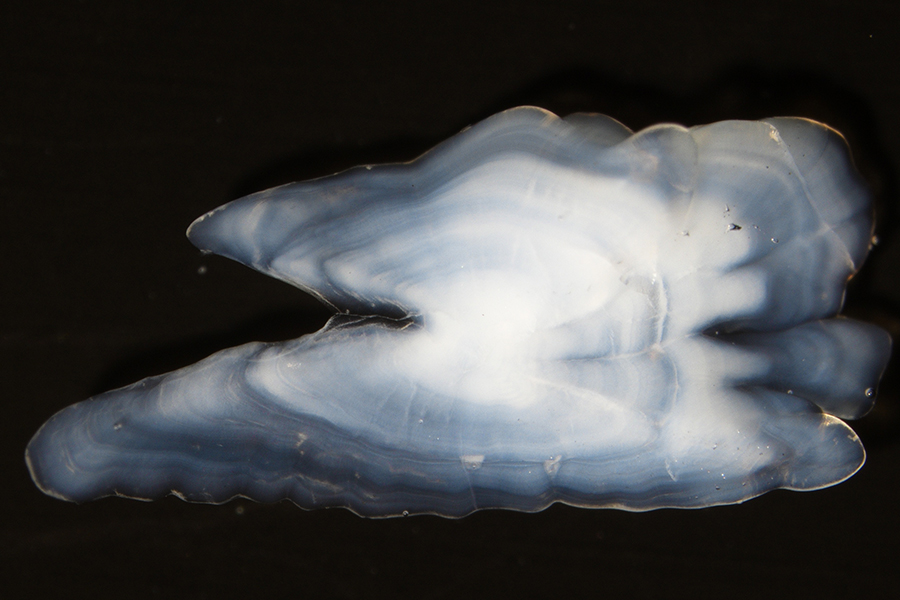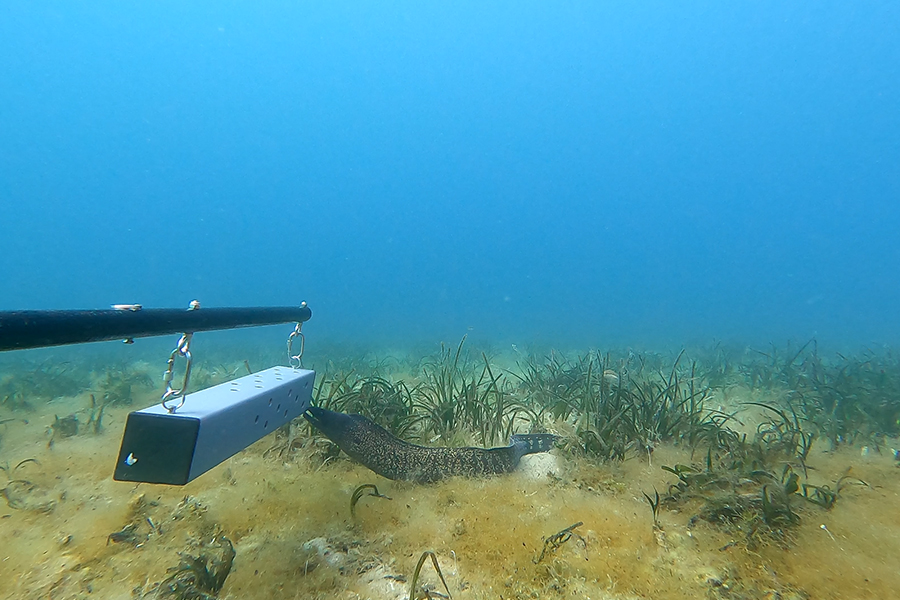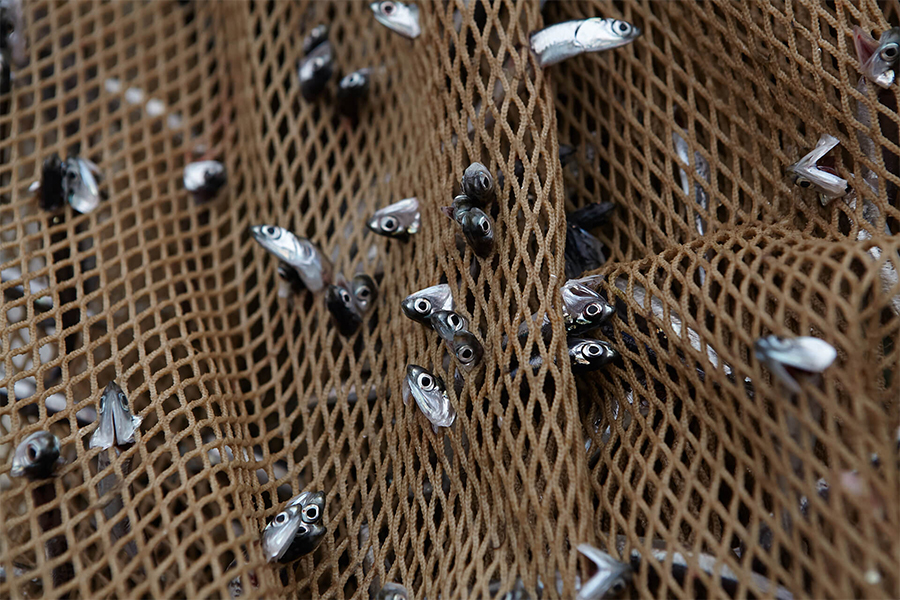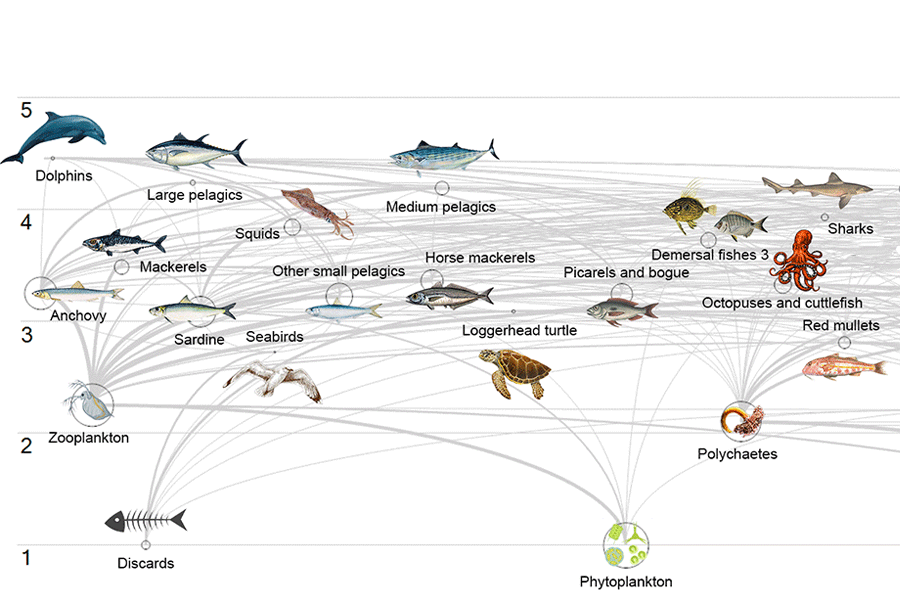Research
MEFL follows a broad, interdisciplinary approach to promote an ecocentric understanding of marine ecosystem functioning and dynamics under external drivers such as fisheries exploitation and climate change. Towards this objective, MEFL people use a wide range of scientific approaches to investigate key processes in marine ecosystem dynamics and fisheries combining field studies with numerical and statistical modelling approaches. Research actions of interest include both basic and applied research hypotheses with respect to marine ecosystems and fisheries of the Mediterranean Sea.
Fish biology and ecology
MEFL has a long history in studying the biology (maturity, fecundity, spawning, ageing, growth, mortality, weight-length relationships, feeding and trophic level) of marine fishes in the Aegean Sea including energetic trade-offs and species trophic interactions.
MEFL people have published a series of review articles in the biology of Mediterranean marine fishes and identified gaps in biological knowledge across the Mediterranean Sea. Recent publications aimed at filling in missing biological information, while current research focuses on ageing and growth parameter estimation of alien species in the Aegean Sea. MEFL has been actively involved in the FishBase Consortium for many years and leads the Mediterranean hub of FishBase.
Monitoring of marine populations
MEFL studies the structure and dynamics of marine populations and their interactions with external drivers such as fisheries and climate change/variability.
The lab has been examining the effect of fisheries restrictions on habitats, fish stocks and their somatic sizes, mapping marine mammal – fisheries interactions in the Aegean Sea, monitoring marine mammals distribution using mobile platforms such as ocean gliders equipped with acoustic sensors, observing the pelagic predators using underwater baited cameras and monitoring fish communities using underwater drones. MEFL has been involved in several studies focusing on the effect of climate change and variability on marine populations, especially small pelagic fishes, of the Mediterranean Sea and the NE Atlantic Ocean.
Stock assessment and fisheries management
MEFL is involved in assessing the status of Mediterranean fisheries by applying fish population dynamics models to predict stock status and fisheries exploitation patterns within the MSY concept.
MEFL members have been involved in the development of methods for assessing the stock size and exploitation status in data-poor areas using only available catch/landings data and stock resilience or using abundance and length frequency distributions when catch/landings data are not available. MEFL staff are also active members of stock assessment working groups of international organizations and ad hoc scientific initiatives.
Ecosystem modelling
MEFL staff have developed three ecosystem models in the Aegean Sea using EwE (Ecopath with Ecosim) and performed simulations in time and space aiming to evaluate a number of fisheries management hypotheses involving the use of marine protected areas and harvest control rules.
Future ecosystem modeling work includes the incorporation of oceanographic data in spatial models of the Aegean Sea and the examination of ecotrophic indicators. A fisheries module of the MSP Challenge Simulation Platform will be developed for the eastern Mediterranean Sea that will provide management options to ensure sustainable fisheries, protect biodiversity and habitats and reduce conflicts among different marine activities and sectors.

Fish biology and ecology
MEFL has a long history in studying the biology (maturity, fecundity, spawning, ageing, growth, mortality, weight-length relationships, feeding and trophic level) of marine fishes in the Aegean Sea including energetic trade-offs and species trophic interactions.
MEFL people have published a series of review articles in the biology of Mediterranean marine fishes and identified gaps in biological knowledge across the Mediterranean Sea. Recent publications aimed at filling in missing biological information, while current research focuses on ageing and growth parameter estimation of alien species in the Aegean Sea. MEFL has been actively involved in the FishBase Consortium for many years and leads the Mediterranean hub of FishBase.

Monitoring of marine populations
MEFL studies the structure and dynamics of marine populations and their interactions with external drivers such as fisheries and climate change/variability.
The lab has been examining the effect of fisheries restrictions on habitats, fish stocks and their somatic sizes, mapping marine mammal – fisheries interactions in the Aegean Sea, monitoring marine mammals distribution using mobile platforms such as ocean gliders equipped with acoustic sensors, observing the pelagic predators using underwater baited cameras and monitoring fish communities using underwater drones. MEFL has been involved in several studies focusing on the effect of climate change and variability on marine populations, especially small pelagic fishes, of the Mediterranean Sea and the NE Atlantic Ocean.

Stock assessment and fisheries management
MEFL is involved in assessing the status of Mediterranean fisheries by applying fish population dynamics models to predict stock status and fisheries exploitation patterns within the MSY concept.
MEFL members have been involved in the development of methods for assessing the stock size and exploitation status in data-poor areas using only available catch/landings data and stock resilience or using abundance and length frequency distributions when catch/landings data are not available. MEFL staff are also active members of stock assessment working groups of international organizations and ad hoc scientific initiatives.

Ecosystem modelling
MEFL staff have developed three ecosystem models in the Aegean Sea using EwE (Ecopath with Ecosim) and performed simulations in time and space aiming to evaluate a number of fisheries management hypotheses involving the use of marine protected areas and harvest control rules.
Future ecosystem modeling work includes the incorporation of oceanographic data in spatial models of the Aegean Sea and the examination of ecotrophic indicators. A fisheries module of the MSP Challenge Simulation Platform will be developed for the eastern Mediterranean Sea that will provide management options to ensure sustainable fisheries, protect biodiversity and habitats and reduce conflicts among different marine activities and sectors.
